Search Results
Showing results 21 to 40 of 43
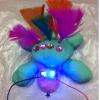
Dough Creatures
Source Institutions
In this technology activity, learners light up the room with electrifying play dough creations. Learners use conductive and insulating homemade play dough to build simple circuits.
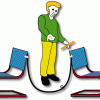
Raceways
Source Institutions
In this activity, learners build a model roller coaster to help the Mummy entertain the Atom's Family monsters. Learners assemble the roller coaster between two chairs using vinyl ceiling molding.

Ramp it Up
Source Institutions
In this activity, learners will build ramps and test how the laws of physics apply do different objects. Learners will explore physics and cause and effect through this activity.

Can Energy be Created or Destroyed?
Source Institutions
In this activity, learners explore conservation of energy by experimenting with a solar cell light device.
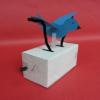
Cranking Bird
Source Institutions
In this activity, learners build a mini crank machine to make a bird "fly." This engineering activity introduces learners to automata, rotational motion, cranks and cams.

Rubber Band Racers
Source Institutions
In this activity, learners explore the design of rubber band powered cars. Learners work in teams of "engineers" to design and build their own rubber band cars out of everyday items.
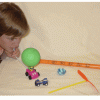
What is Energy?
Source Institutions
In this exploratory activity, learners experiment, observe and determine how various toys change from one form of energy to another.

Exploring the Solar System: Moonquakes
Source Institutions
In this activity, learners sort different natural phenomena into categories (they occur on Earth, on the Moon, or on both), and then model how energy moves during a quake using spring toys.
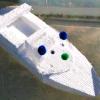
Rubber Band Boat
Source Institutions
In this activity, learners build styrofoam boats powered by twisted rubber bands.

Interactive Gumball Machine
Source Institutions
In this activity, learners review the history of gumball machines and explore potential and kinetic energy, while working in teams to build a gumball slide.
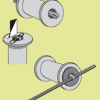
All Wound Up
Source Institutions
In this activity, learners build a racecar using only a rubber band, spool, straw, and paper clip! This racer is a classic toy that zips across a flat surface.

Build a Roller Coaster
Source Institutions
Learners design and build a roller coaster using simple materials. Learners experiment with potential and kinetic energy to get a marble to follow a track into a cup.
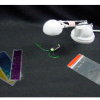
Why are Compact Fluorescent Bulbs More Efficient?
Source Institutions
In this activity, learners explore the relative efficiency of different bulbs, specifically incandescent vs. fluorescent.
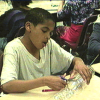
Pop Bottle Whirligig
Source Institutions
Learn about friction and kinetic energy with this cool spinning toy.
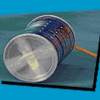
Spool Racer
Source Institutions
In this physics activity, challenge learners to make a rubber band-powered spool racer. Demonstrate principles of motion as well as potential and kinetic energy.
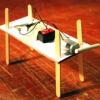
Minibot
Source Institutions
In this activity, learners build a mini dancing robot. This engineering activity introduces learners to electricity, circuits, switches, conductivity, and motors.

Can Car
Source Institutions
In this physics activity, challenge learners to make a race-car out of a coffee can and rubber band. Demonstrate motion, forces, kinetic and potential energy and friction.

Make a Comeback Can
Source Institutions
Learners build a can that automatically returns after being rolled away. The can has a rubber band inside that stores energy as the can rolls one direction.

Engineered Sports
Source Institutions
In this activity, learners explore the concept of how aerospace engineering has impacted sports, specifically exploring the design of golf balls.

Two Ball Bounce
Source Institutions
This is a quick, yet dramatic activity/demonstration that introduces learners to the concept of energy transfer. A small ball is placed on top of a large ball and both are dropped together.
